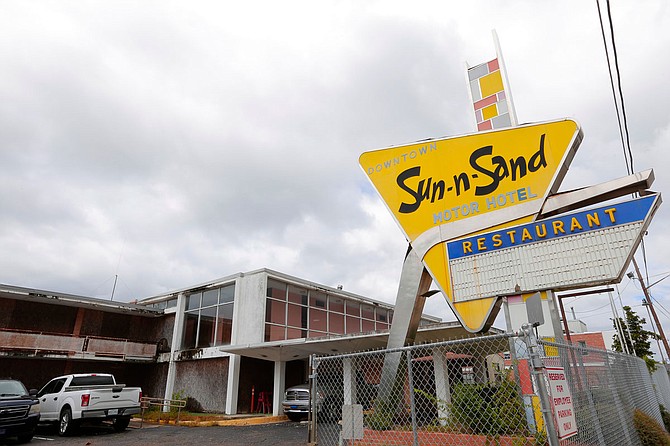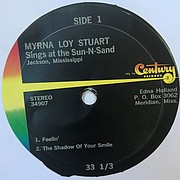The Mississippi Heritage Trust is trying to save the historic Sun-N-Sand Motor Hotel from demolition. After acquiring the property in July, the State of Mississippi announced plans to demolish the structure and turn it into a parking lot for government employees. Photo by Imani Khayyam
Not long into working the bar at the iconic Sun-N-Sand Motor Hotel in downtown Jackson, Rudolph "Cotton" Baronich thought he had seen it all. Legislators, athletes, celebrities, and businessmen were among the clients who frequented the Sun-N-Sand and the George Street Grocery, where he had previously tended bar.
Then a petite, brunette woman wearing high heels and a "top-of-the-line" suit walked into the Sun-N-Sand one night around 1970. Baronich was spell-bound.
"Who is that? My goodness," he asked Sara Taylor, a patron and the bookkeeper at Patterson's Drug Store on State Street. Taylor said the woman, Jean Shamburger, was her sister. Shamburger was a dancer, and she didn't drink, but she had come to the bar that night to hear the popular in-house entertainer and actress Myrna Loy sing.
Baronich and Shamburger hit it off. It took Baronich, now 90, a year to find the right ring before he proposed to her. The couple were married from 1971 until Shamburger's death in 2008.
Meeting his wife is Baronich's favorite memory from working at the Sun-N-Sand, but others jump out, like his close friendship with the grumpy but charismatic University of Alabama football coach Paul William "Bear" Bryant. A bibulous, big-shot federal magistrate judge from Mississippi was furious with Baronich for cutting him off one night, but quietly thanked him the next morning after emerging from his bed "rough-looking" and with a hangover.
Then there were the men of all ages and backgrounds who regularly sought Baronich's advice when their marriages were suffering, only to return weeks or months later to tell him that the advice worked.
"I knew how to handle (people) ... I became a psychiatrist in the business," Baronich said in an interview in his home in Madison, Miss., last week.
"It was jumping," Baronich continued as he reflected back on working at what was at one time Jackson's hippest bar. "It was the elite place back in them days. All the legislators—if you had business at the Capitol, you stayed at the Sun-N-Sand with us."
'Cultural Identity of Our State'
The Sun-N-Sand, located on Lamar Street and steps away from the Mississippi Capitol, has sat vacant and fenced in since 2002, but its place in Jackson's collective memory remains vivid for Baronich and others. The salmon-colored, mid-century modern structure is now slated for demolition after its new owner, the State of Mississippi, acquired it last July, along with the the Wright & Ferguson Funeral Home on West Street, for $2.3 million. The State wants to tear down the building and build a parking lot on the site for state employees.
But the Mississippi Heritage Trust has been fighting to halt that decision with backing of community members in Jackson and elsewhere in Mississippi, designating it in 2005 as one of Mississippi's 10 Most Endangered Historic Places.
The Trust's goal is to initiate a conversation to consider other plans for the building, such as the potential for redevelopment, with input from the public, Mississippi Heritage Trust Executive Director Lolly Rash said in an interview.
"It's in the cultural identity of our state," Rash said of the Sun-N-Sand. "It's not only a Jackson building. People all over the state know this building, and they love it. And I know this because we have been talking to people about it."
When businessman and developer R.E. "Dumas" Milner opened the Sun-N-Sand in 1960, it was the capital city's first motel in the downtown area. Soon, the establishment became a temporary home for state legislators and lobbyists who would hole up in the rooms, the bar or dining room to discuss ideas during legislative sessions at the nearby Mississippi Capitol.
"Everything you ever needed to know about what's going on, you could find out at the breakfast table," retired Mississippi Rep. Steve Holland, D-Plantersville, told the Associated Press in 2009. He had lived there for his first 14 years in the Legislature. "Hell, if you didn't know it, you could start a rumor at 5:30 in the morning. It'd be around the Capitol later that day."
And rumor has it, it was understood that much of what happened at the Sun-N-Sand stayed at the Sun-N-Sand.
The motel figures prominently in Mississippi's literary history. The novelist John Grisham wrote "A Time To Kill" while living in a room there when he served as a state legislator. Kathryn Stockett's novel "The Help" mentions the motel, and writer Willie Morris, who wrote "New York Days" about his time as the editor of Harper's Magazine in New York City while staying at the Sun-N-Sand, also referenced the "egregious political wheelings and dealings" and "secretive trysts" that took place there in another book, "My Cat, Spit McGee." Spit hung out there with Morris there as he was writing "New York Days."
"In the shadowy bar with Patsy Cline and Hank Williams and Loretta Lynn on the jukebox, or in the dining room at breakfast, the pols more or less passed that day's legislation, merely to be formalized later on the floors of the capitol," Morris wrote.
Integrated Early
Located near the Farish Street Historic District, the motel conjures up important memories for Jackson's black residents as well. As the historian Tiyi Makeda Morris notes, in 1965, the multiracial women-led civil-rights initiative "Wednesdays in Mississippi," or WIMS, hosted integrated lunches at the Sun-N-Sand. National reporters camped there, covering the Civil Rights Movement as it unfolded in real time in Jackson.
Retired teacher and athletic coach Fred "Jazz" Clark, who grew up near Millsaps College, got a job bussing and waiting tables at the Sun-N-Sand in 1962 while a freshman in college at Jackson State University. A Jackson native and freedom rider who had gone to prison in 1961 for his participation in the Civil Rights Movement, Clark struggled to find a job upon his release. The Sun-N-Sand was one of few non-black-owned businesses in Jackson that employed black people and treated them fairly, he said. A Jewish man there by the name of Mr. Lewis hired Clark.
"The Sun-N-Sand represented hope for me and the children, all the people I grew up around ... because there were black people in there given jobs," Clark said in an interview. Black people did not simply occupy menial positions there, he said, but were given greater responsibilities, including as supervisors. Sometimes, management allowed them to use the building to host their own private events.
"People were proud to say that they worked there," Clark said. A lot of young black college students financed their education by working at the Sun-N-Sand, where they could earn decent money between salaries and tips, he added.
A 'Time Capsule'
"Here we have a building that talks to so many issues about who we are as a state, and rather than even trying, we are going to make it a parking lot," Lolly Rash said about the State of Mississippi's plan to destroy such a cultural landmark.
"It's the default of the position when you haven't done your homework."
A period of public comment for the Trustees for the Mississippi Department of Archives and History to consider the Sun-N-Sand Motor Hotel as a state landmark ended Dec. 5, but Rash said there is still opportunity to sway public opinion and halt the Mississippi Department of Finance and Administration's plan to demolish the structure.
The demolition plan, Rash said, serves only the interests of the State of Mississippi, which views it as an opportunity to increase parking space for government employees without considering redevelopment potential or the motel's significance to the local community and its place in Mississippi's larger political, racial, literary, architectural and economic history.
"Our position is that we haven't looked at all our options, yet," she said.
The State of Mississippi has maintained that the building should be demolished, but Rash and the Mississippi Heritage Trust are pushing for an engineering study, a historic structures report and the opportunity for developers to weigh in on the conversation.
"I am never going to take someone at face value who tells me that something can't be saved if they're the ones tearing it down," Rash said, referring to its interior as an "incredible time capsule."
A recent Mississippi Landmark Significance Report states that the Sun-N-Sand has "high architectural integrity, retaining its early form, its sturdy concrete construction, and most original architectural details such as light fixtures ... decorative ironwork and concrete tiles, and doors," as Mississippi Department of Archives and History's Chief Architectural Historian Jennifer V.O. Baughn wrote.
The building is a rare example of International-style modernism in Jackson. Its iconic sign is a nod to the futuristic Googie design, a form originating in southern California in the 1950s. Googie was defined by its aesthetic of exaggeration, plastic and neon, and a "wide-eyed technological optimism," as Smithsonian Magazine described it. Baughn wrote that businesses located along roadsides preferred the bright and angular Googie aesthetic as it stood out more than traditional advertising to patrons driving on the roads at high speeds.
At one time, Mississippi had many examples of Googie buildings and signs, many of them along the Gulf Coast, but Hurricane Camille destroyed most in 1969. Baughn maintains that the Sun-N-Sand sign is "probably the state's best surviving example of a Googie sign."
Developers can tap into historic tax and income credit incentives to transform the property, which is located in an opportunity zone and in Jackson's African American business corridor. Senior housing and live-work units for legislators, teachers, or law students from the nearby Mississippi College School of Law are among the redevelopment ideas that residents and developers have proposed so far.
Regardless of the structure's fate, the process must include input from the community, Rash said.
'A Seat at the Table'
So far, the City of Jackson seems left out of the conversation. Rash pointed out that the State's plan to transform the motel into a parking lot challenges the City of Jackson's zoning laws. Surface parking is not allowed in that area without a Use Permit, Jackson Planning and Development Director Jordan R. Hillman confirmed.
But in 1991 the Mississippi attorney general issued an opinion that excuses the State from meeting municipal zoning and building codes, she added.
"Making sure that the City of Jackson has a seat at the table to talk about what happens in the downtown is really important," Rash said. "That hasn't happened, yet."
"The mayor does not feel as if demolition of the historic Sun-N-Sand site is necessarily the answer. (He) would like to see more ... study of the area to see what development opportunities might actually lie there, but as of this moment, the stance is demolition is not the answer," City spokeswoman Candice Cole said.
In a sense, the way that the State of Mississippi is handling the Sun-N-Sand is reminiscent of a history of State-level decision-making that invites little input from the City but wields significant influence on its economic, political and social life.
In August, for example, a judge ruled that capital-city residents do not have a say in the governance of their municipal airport, after State legislators took over control of the Jackson-Medgar Wiley Evers Airport in 2016, despite the fact that other cities in America retain control of their municipal airports.
The Jackson Municipal Airport Authority had filed a lawsuit against the State of Mississippi, claiming that the takeover of an airport from a majority-black government, in a majority-black city, was racially motivated, but Judge Patrick Higginbotham of the 5th U.S. Circuit Court of Appeals ruled in the State's favor.
Chuck McIntosh, director of communications for the Mississippi Department of Finance and Administration, said State officials have walked through the Sun-N-Sand with the Mississippi Department of Archives and History, another state agency.
"They're making the determination if it should be put on the historical register," he told the Jackson Free Press on Dec. 10. McIntosh added that State of Mississippi property is not subject to the City of Jackson's zoning regulations.
Jackson State professor and former Jackson Planning and Development Director Mukesh Kumar noted that a quarter of downtown real estate is already devoted to parking. "That is on the higher side," he said in an interview, adding that there is a shortage of open public space and high rates of office vacancies in the city. The notion that downtown does not have enough parking is misguided, Kumar believes.
"It's because everybody wants parking right on their doorstep."
He said the downtown business district covers about 330 acres, which includes 87 acres of parking lots and spaces.
On its website, Downtown Jackson Partners boasts of "plentiful" parking downtown at more than 10,000 spaces.
Rash argues that preserving the Sun-N-Sand could help build community.
"What does Jackson need, what does it need the most? It doesn't need a parking lot, so let's look at the development (opportunities)," she said.
"If in the end, if after we've exhausted our options, and we don't find a good development solution, that's when you talk about demolition. But you don't start there," she added.
Follow City Reporter Seyma Bayram on Twitter @SeymaBayram0. Send tips to seyma@jacksonfreepress.com. Residents who wish to become involved in preservation efforts can write to the Mississippi Heritage Trust at preservation@mississippiheritagetrust.com or contact their state representatives and senators.
More like this story
More stories by this author
- City Announces Robinson Road Repaving Project; Stay-At-Home Order Still in Effect
- City of Jackson Sues Canadian National Railway Over Blocked Railroad Underpass
- Mayor Lumumba Revises, Extends Jackson Stay-at-Home Order
- Mississippi Justice Institute Sues Mayor Lumumba for Open-Carry Order
- Jackson Attorney with COVID: ‘A False Sense of Protection Here’






Comments
Use the comment form below to begin a discussion about this content.